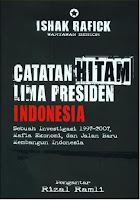Ketika Suharto jatuh dari kekuasaannya pada 1998 saya tidak memxvi KATA PENGANTAR EDISI BAHASA INDONESIA bayangkan bahwa satu dekade kemudian pemerintah akan terus melarang buku-buku yang tidak sesuai dengan propaganda rezim yang lalu. Rezim Suharto mengklaim bahwa PKI bertanggung jawab atas G-30-S; partai itu memimpin atau mengorganisasikan G-30-S. Klaim serupa itu dapat diterima sebagai sebuah hipotesa tetapi kita seharusnya berharap diberi sejumlah bukti sebelum kita menerimanya sebagai kesimpulan. Kita juga harus berharap ada rumusan yang lebih persis. PKI adalah sebuah partai dengan anggota kurang lebih tiga juta orang. Kalau pemerintah berniat bersikukuh bahwa “PKI” mengorganisasikan G-30-S, maka pemerintah harus mampu menjelaskan siapa di dalam PKI yang mengorganisasikan gerakan tersebut. Apakah tiga juta anggota partai secara keseluruhan bertanggung jawab? Atau kah sebagian? Atau hanya pimpinan partai? Apakah pihak pimpinan itu Central Comite atau Politbiro? Sepanjang masa kepemimpinan Suharto pemerintah tidak pernah dengan telak mengidentifi kasi siapa di dalam PKI yang bertanggung jawab. Malahan, dengan secara terus-menerus menggunakan istilah “PKI” masyarakat digiring untuk percaya bahwa bukan hanya seluruh tiga juta anggota partai yang bertanggung jawab, tetapi juga siapa pun yang berhubungan dengan partai, seperti para anggota organisasi-organisasi sealiran (seperti Lekra), bertanggung jawab.
Dokumen-dokumen internal rezim Suharto lebih terus terang. Kebetulan saya menemukan buku yang ditulis Lemhanas pada 1968 untuk pejabat-pejabat pemerintah yang persis mengajukan pertanyaanpertanyaan di atas. Buku 80 halaman ini ditulis dalam bentuk tanyajawab. Berikut satu bagian tentang tanggung jawab “PKI”: Pertanyaan: Apakah benar bahwa G-30-S/PKI yang menggerakkan adalah PKI dan apakah setiap anggota PKI tentu terlibat dalam G-30-S/PKI?
Jawab: Benar
Dokumen-dokumen internal rezim Suharto lebih terus terang. Kebetulan saya menemukan buku yang ditulis Lemhanas pada 1968 untuk pejabat-pejabat pemerintah yang persis mengajukan pertanyaanpertanyaan di atas. Buku 80 halaman ini ditulis dalam bentuk tanyajawab. Berikut satu bagian tentang tanggung jawab “PKI”: Pertanyaan: Apakah benar bahwa G-30-S/PKI yang menggerakkan adalah PKI dan apakah setiap anggota PKI tentu terlibat dalam G-30-S/PKI?
Jawab: Benar











